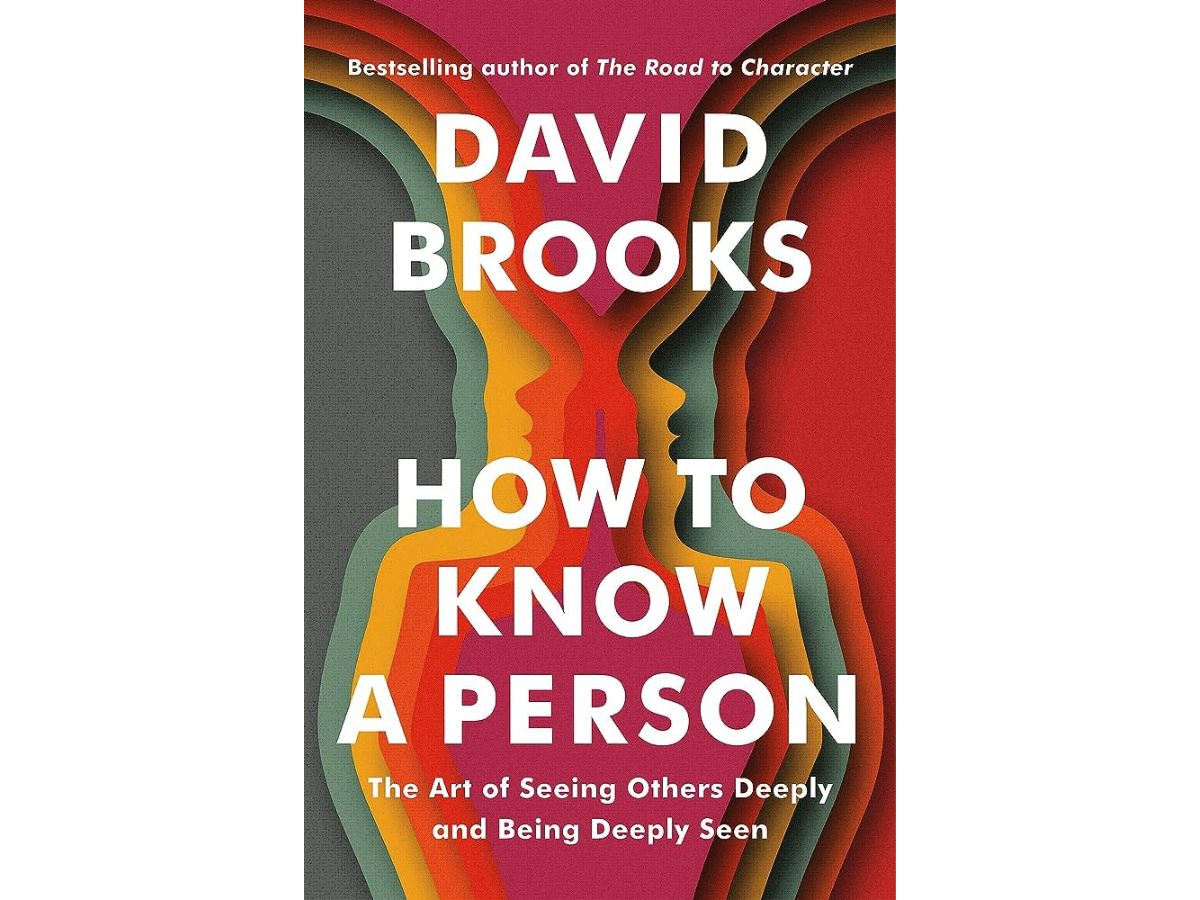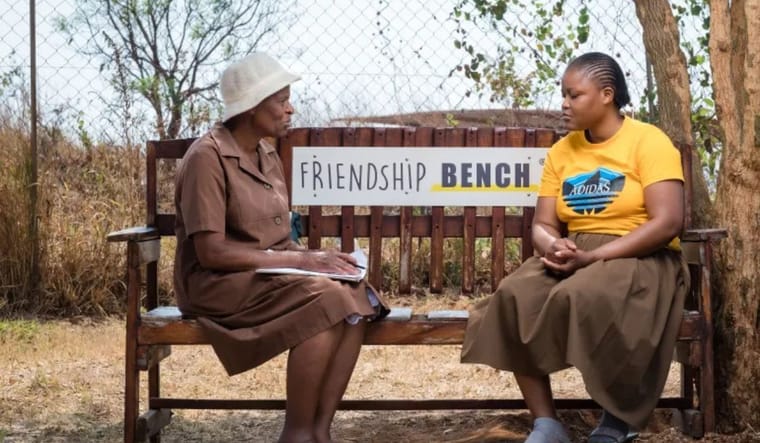What Would Life Be Like if We All Felt a Little More Seen—and Heard? Bestselling Author David Brooks Has the Answer
Over the course of the last few years, David Brooks started noticing what he calls a “relational crisis” in our country.
Depression and suicide rates are on the rise. A staggering 36 percent of Americans report feeling lonely. The number of people who say they have no close personal friends has quadrupled. It was all so disturbing and noteworthy to the New York Times op-ed columnist and bestselling author.
“I was noticing these trends, which I see as an epidemic of blindness,” says Brooks. “We’re not seeing each other well. We’re not treating each other well. My aspiration in writing this book personally—and for the country—was to get a lot better at recognizing people and making them feel heard and understood. It seemed very important to know the skills that help us understand each other, and very important to try to teach them to myself and others.”
In his new book, How to Know a Person, Brooks walks all of us through the essential skills he learned. This week, he sat down with The Sunday Paper to share what he knows about how to foster deeper connections—with family, friends, colleagues, and even strangers—and why practicing the art of truly knowing another person is more needed now than ever before.
A CONVERSATION WITH DAVID BROOKS
We are living in polarizing times. Where do we start when it comes to interactions with people who feel differently than we do?
When you encounter someone you disagree with, your first job is to stand in their viewpoint. It’s not to challenge them right away. Ask them three questions, all about the same thing, all getting at this: Tell me more about why you think that.
When I’m with someone, I never ask: What do you think about this? I always ask, How did you come to believe this? That way, they’re telling you a story about the people or experiences that shape their values. And if you get people in storytelling mode, you’re seeing a more complicated version of who they are. You may never agree with them. But you’ll think, I’m beginning to get where you’re coming from, I get that.
That’s the way you preserve trust and respect across disagreement.
You write that doing the creative work of looking someone in the eye and seeing something large in them helps us see something larger in ourselves. Why is this?
The episode that illustrates the way I like to look at people in the eye happened to me in Waco, Texas.
I’m having breakfast with LaRue Dorsey, a 93-year-old a lady who used to be a teacher. And she presented herself to me as this strict disciplinarian. Into the diner where we’re having breakfast walks and a mutual friend of ours, Jimmy Dorrell. He comes up and grabs Mrs. Dorsey by the shoulders and says, “Mrs. Dorsey you’re the best. I love you, I love you.” And that stern disciplinarian I’d been talking to turned into this bright, eye-shining 9-year-old girl. That little episode illustrates to me just the power of attention.
Whenever we meet somebody, we’re asking ourselves unconscious questions like, Am I a priority to this person? Am I a person to them? And the answers to those questions get expressed in our eyes before words come out of our mouths.
The thing about Jimmy is that he’s a pastor. When he meets anybody, he’s meeting someone who he believes is made in the image of God, as someone who is a soul of infinite value and dignity. You can be a Christian, Jewish, Muslim, atheist, agnostic, whatever. But seeing people with that level of reverence and respect Jimmy showed Mrs. Dorsey is an absolute precondition for seeing them well.
How do all of us start to do this more frequently—to be more like Jimmy?
You start small. The first act is simply showing a warm gaze to somebody, whether it’s at a coffee shop or at home when you’re hosting a dinner.
The second step is playful small talk. Some people hate small talk, but I like it because we can’t really feel safe with each other until our bodies are comfortable. I have two friends who say, “We like people who are lingerable.” Those are people it’s fun to linger with because they’re playful. That’s a way to build trust.
And then the crucial activity is just having conversations. It’s being a really good conversationalist. The problem is a lot of us think we’re good conversationalists, but we’re not nearly as good as we think we are. We don’t have conversations that we’ll remember 10 minutes later. We have shallow conversations.
In writing this book, I learned the tips to be a great conversationalist. One of them is to be a loud listener. When somebody’s talking to you, you should be listening so actively you’re burning calories. Another one is to keep the gem statement in the center. The gem statement is the truth underneath the disagreement—something you both agree on. My brother and I are disagreeing about our dad’s health care right now, but we agree that we both want what’s best for our dad. And so if we keep that gem statement—what we agree on—in the center of our conversations, we preserve the relationship when we disagree.
How has reporting and writing this book changed your own interpersonal interactions?
First, I’m way more likely to talk to a stranger in a coffee shop or on a plane or train than I was before. I used to bury myself in a book. And I find I’ve had many really memorable conversations.
I also think I’m more emotionally vulnerable with people now. I’m very eager to hear people tell me about hard times in their lives, and I don’t try to fix them. It’s a great act to just sit there with them when they say the things that bother them and respond, Tell me a little more about that. That’s an act of generosity.
If you shine your attention on me, I blossom. It’s a very generous act to make someone feel seen. In writing the book, I asked so many people, “Tell me about a time you felt seen,” and with glowing eyes, they described these magic moments in their lives where someone just got them.
Is making people feel seen second nature to you now?
The way I think about it is like drama school. When actors go to drama school, they learn all these techniques. But when they’re on stage, they don’t think about those techniques. It just becomes their way of being. They’ve internalized the rules.
And so in the book, I have tips for how to ask great questions. Things like, What crossroads did you have in your life? How were you shaped by your ancestors? These are big questions that get people talking about themselves. But you don’t want to go through a memorized list of questions. You want it to be natural.
There’s a phrase, “The way you know people is your way of being in the world.” The kind of attention you shine on people becomes who you are. If you see the world with critical eyes, you’ll see flaws in people. If you see the world with generous eyes, you’ll see people in the struggle doing the best they can.
You say that in every family, organization and community, there are diminishers and illuminators. Can you describe each? And how can all of us be illuminators more of the time?
Diminishers are people who stereotype or ignore; they’re not curious about other people and they make people feel invisible and unseen. Illuminators, on the other hand, are very curious about people. They’re good at asking questions, they make you feel respected and lit up. They’re wonderful to be around.
One of the stories of an illuminator I came across happened at a research facility. The executives of the company wondered why some of their researchers were more innovative than others, and they couldn’t figure it out. Was it education or IQ? Turned out the most innovative researchers were in the habit of having breakfast or lunch with a guy named Harry Nyquist, an engineer. He got inside their heads. He asked good questions, walked with them through their problems, and he helped them solve problems. He was an illuminator, willing to take on other people’s point of view.
One way you can tell if you’re an illuminator is to answer this: Do you ask people questions? I’ve found in life that about 30 percent of people are question-askers and 70 percent are perfectly nice people, they’re just not question-askers.
Asking questions is a moral act. It’s a show of respect. And it gets people to go to a place where they probably want to go—people love to tell their life story.
If readers do one thing differently after finishing your book, what would you want that to be?
To go into every encounter with people thinking, How can I take this conversation to a deeper level than normal?
There’s a guy named Dan McAdams who studies how people tell the story of their lives. He pulls people in and asks for the essence of their high points, low points, and turning points. The conversation goes on for like four hours. And at the end, he says, “Here’s a check to compensate you for your time.” A lot of people say, “I’m not going to take your money! This has been one of the best afternoons I’ve ever had. No one’s ever asked me to tell that story.”
I’ve found that people will talk. People want to tell the story of their life. And when you prompt them to do that, you’re not only making them happy and learning a lot about human beings. You’re leaving a residue. Those people go through life knowing, Somebody saw me. It’s a very generous thing you can give another, and it’s a very fun thing you can give to yourself.

David Brooks is one of the nation’s leading writers and commentators. He is an op-ed columnist, for the New York Times, a writer for The Atlantic and appears regularly on the PBS Newshour. He is the bestselling author of The Second Mountain, The Road to Character, The Social Animal, Bobos in Paradise, and On Paradise Drive.
Please note that we may receive affiliate commissions from the sales of linked products.



